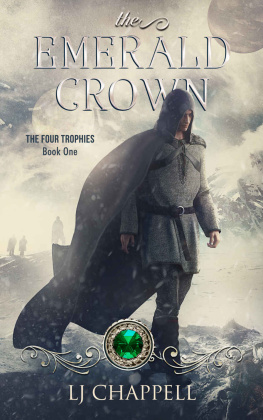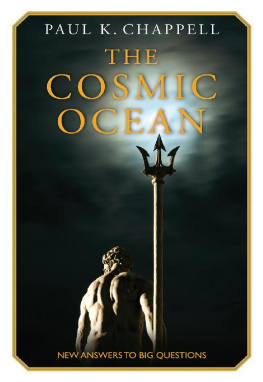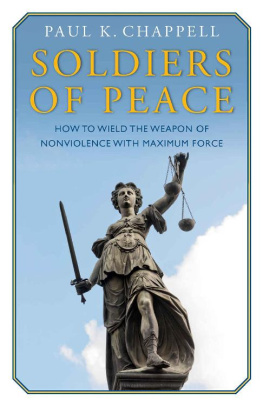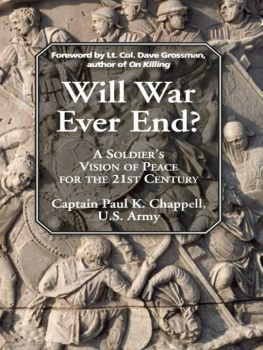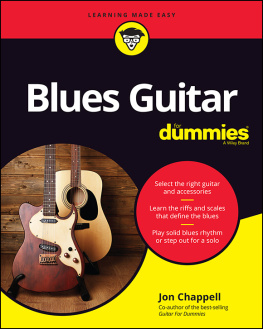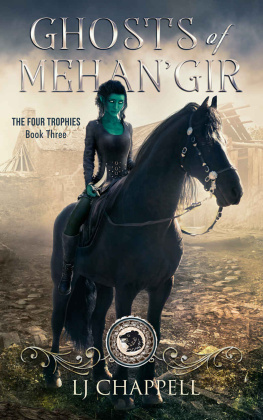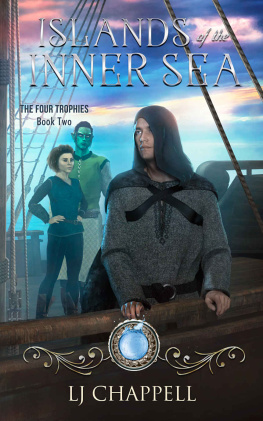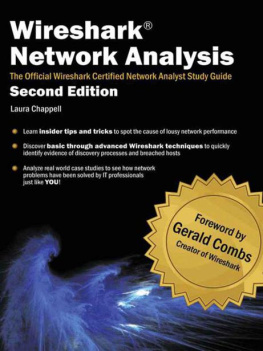L J Chappell [Chappell - The Emerald Crown
Here you can read online L J Chappell [Chappell - The Emerald Crown full text of the book (entire story) in english for free. Download pdf and epub, get meaning, cover and reviews about this ebook. year: 2018, publisher: Asquith Publishing, genre: Detective and thriller. Description of the work, (preface) as well as reviews are available. Best literature library LitArk.com created for fans of good reading and offers a wide selection of genres:
Romance novel
Science fiction
Adventure
Detective
Science
History
Home and family
Prose
Art
Politics
Computer
Non-fiction
Religion
Business
Children
Humor
Choose a favorite category and find really read worthwhile books. Enjoy immersion in the world of imagination, feel the emotions of the characters or learn something new for yourself, make an fascinating discovery.
- Book:The Emerald Crown
- Author:
- Publisher:Asquith Publishing
- Genre:
- Year:2018
- Rating:4 / 5
- Favourites:Add to favourites
- Your mark:
- 80
- 1
- 2
- 3
- 4
- 5
The Emerald Crown: summary, description and annotation
We offer to read an annotation, description, summary or preface (depends on what the author of the book "The Emerald Crown" wrote himself). If you haven't found the necessary information about the book — write in the comments, we will try to find it.
L J Chappell [Chappell: author's other books
Who wrote The Emerald Crown? Find out the surname, the name of the author of the book and a list of all author's works by series.
The Emerald Crown — read online for free the complete book (whole text) full work
Below is the text of the book, divided by pages. System saving the place of the last page read, allows you to conveniently read the book "The Emerald Crown" online for free, without having to search again every time where you left off. Put a bookmark, and you can go to the page where you finished reading at any time.
Font size:
Interval:
Bookmark:
The Emerald Crown
L J Chappell
THE EMERALD CROWN
Kindle Edition
Copyright 2018 L J Chappell
All rights reserved.
Cover Design by Diana Buidoso
Published by Asquith Publishing
Contents
Chapter One
Lanvik
He had no memory of where he was, who he was, or why he wasthere.
He had no memory of any time before the dark stone prison:no memory of anything earlier than a few days before.
He believed that he was somewhere in the Northlands, andthat it was winter.
There was a small window high in the wall above his headthat let the bitter cold into the cell. It was a simple opening a deeprecess: sometimes the sun cast shadows on the opposite wall, and he could seethat there were bars. Pointless bars. Even if he could have reached the recess,it was tiny. He supposed that it would have been large enough for rats to passthrough, but the cell was so inhospitable that there were no rats.
There were smells and sounds from outside. The smells weredistant and stale, and the loudest noises he heard were of small numbers ofpeople passing by: no-one talking, no-one laughing, no-one arguing. So hiswindow didnt open onto anywhere that life was being lived: his prison wasinside a compound of some sort perhaps a castle or a fortress. Sometimes heheard voices raised in anger or laughter but they were far away, and sometimeshe heard the raucous arguing of seabirds. So he was being held near a town or acity, at most a few miles from the sea.
He could reach the bottom of the little opening with hisfingers. As well as the chill air that blew in, sometimes there was fresh snowand he could gather a thin handful together. Sucking the drops from his fingersmade a refreshing change from the grey foul-tasting water in his bowl.
A pile of damp-smelling straw in one corner served as hisbed, and there were half a dozen torn and filthy blankets for warmth. He had nojacket and no boots he couldnt remember, but he presumed that they had beentaken away from him before he was put in this place. He had thick socks, but sockson their own were not sufficient against the cold, so he wrapped the blanketsaround his feet during the short days: the brief clutch of daylight hours.
When he considered all of these circumstances, he believed thathe was somewhere in the Northlands; that it was winter; that he was in or neara town; and that he was close to the sea.
But when he closed his eyes and tried to remember, hecouldnt bring to mind any maps, any names, any knowledge of places: nothingthat might have narrowed it down to half a dozen named cities. All he had was avague notion that there were Northlands, and he was beginning to believe thathe might have invented that.
He opened his eyes and stared down: todays wooden bowl ofslop had pieces of ice in it. He had sucked on them as if they were a delicacy,hoping that the ice was mostly water.
He had no memory of who he was but the hands holding thebowl, his hands, were soft, as if he had never worked. And the soles of hisfeet were soft, without calluses, as if he had never walked far. So what had hedone, in this Northland place? Was he local, or was he a traveller; a visitor;a captive in some war? He didnt have the hands of a soldier. And when helooked at himself, he didnt have the strength of a soldier. Soldiers werestrong, surely, but he didnt have the strength of someone who had spent hoursexercising to become strong.
So, probably not a soldier.
There were sometimes voices outside the cell that shoutedand cursed and accused, normally after banging and kicking on the thick door tostartle him, to wake him, to scare him. He had heard the voices call him wizard.
When he ran his palms over his head, he could feel that hishair was short, shaved. So maybe they were right and he was a mage. But if hewas a mage, then where was his staff? Had they taken it away from him?
And what of the other mages? Surely, if he was a mage, then theyshould come and rescue him? Unless mages didnt like to interfere, or there wereno other mages, or he had no friends or allies among the other mages. Perhaps magessimply didnt have friends and allies, at least not among other mages. Or perhapsthe other mages didnt know where he was, didnt know that he needed to berescued. If that was the case then it seemed unlikely that they would be ableto find him: in this dark prison cell, near the sea, somewhere in Northlandsthat might or might not exist.
Of course, if he was a mage, then he should be able to use magecraftto escape, shouldnt he?
But he couldnt remember: couldnt remember whether he was amage and couldnt remember anything about magecraft. On the first day that herecalled, he hadnt even thought of trying. On the second day, he hadnt wantedto hadnt wanted to try spells, to command the walls and doors to move asidefor him; hadnt wanted to make a fool of himself. In case someone waslistening.
But how stupid was that? Why would they care what he did now?
He was already locked up: what further sanctions were theylikely to take?
So on the third day, he had shouted and cursed and intoned andcommanded the doors, the walls, even the tiny window. He had waved his hands ingrand, abrupt and unnatural motions like a poor actor, and shrieked Open!until his throat hurt and his voice cracked.
Shut up! voices had shouted back at him from outside thecell, and a boot kicked the door.
And there had been no magic.
He stared at the heavy door. Sometimes he envisaged hisfellow mages rescuing him. That door would be blasted open with fire and smoke,lightning would crash around him and the mages would apologise for taking solong.
The small hatch at the bottom of the door opened and alittle wooden bowl was pushed through. The hatch slammed shut again.
There were two bowls a day: one in the morning and one whenit was dark. Based on the things the people outside called him, and the anger theyseemed to feel towards him, he hated to think what they did to each meal beforepassing it through. Everything about it was revolting: the taste, the texture,the smell and the appearance. But he forced himself to eat it it was probablykeeping him alive. They opened the hatch again half an hour later: if his bowlwasnt sitting there, ready for them to pull back through, then there was nonext meal.
When he contemplated escape, his plans normally centred uponsomehow trapping the hands or feet of his jailers through that tiny hatch. Butthe hatch only opened from the outside, and they used a stick to push the bowlthrough and a hooked stick to pull it back out again. Perhaps two ends of thesame stick.
Apart from the hatch and the tiny opening in the wall thatwas his window, the only other gap in the stonework was a small foul-smellingopening in one corner that he used as a toilet. He hoped that the narrow pipeunderneath was occasionally flushed with water it hadnt been since hearrived.
He had nothing hard that he could dig with no buckle orclasp with his clothes, no spoon with his food. He had nothing hard enough totap against the floor and the walls, to listen for echoes that might reveal a loosestone, a cavity hollowed out by some previous captive or a secret passagethrough to an adjacent cell.
The only way he was going to escape was through the door, andthe thick wood had proved impervious to his shoulder; the walls had similarlyrevealed no weaknesses. He assumed that his only reward for those efforts hadbeen to bruise himself, but the air in the cell was so cold that he hadnt beenbrave enough to peel back his clothes and look.
He had no memory of why he was there, but the same voices thatshouted at him through the door the voices that called him wizard alsocalled him murderer.
He didnt feel like a murderer. But he didnt feel like awizard either.
Was there a particular way that a murderer felt, or thought,or acted? Or did a murderer feel just like any other person, but with thememory of having killed?
Next pageFont size:
Interval:
Bookmark:
Similar books «The Emerald Crown»
Look at similar books to The Emerald Crown. We have selected literature similar in name and meaning in the hope of providing readers with more options to find new, interesting, not yet read works.
Discussion, reviews of the book The Emerald Crown and just readers' own opinions. Leave your comments, write what you think about the work, its meaning or the main characters. Specify what exactly you liked and what you didn't like, and why you think so.

